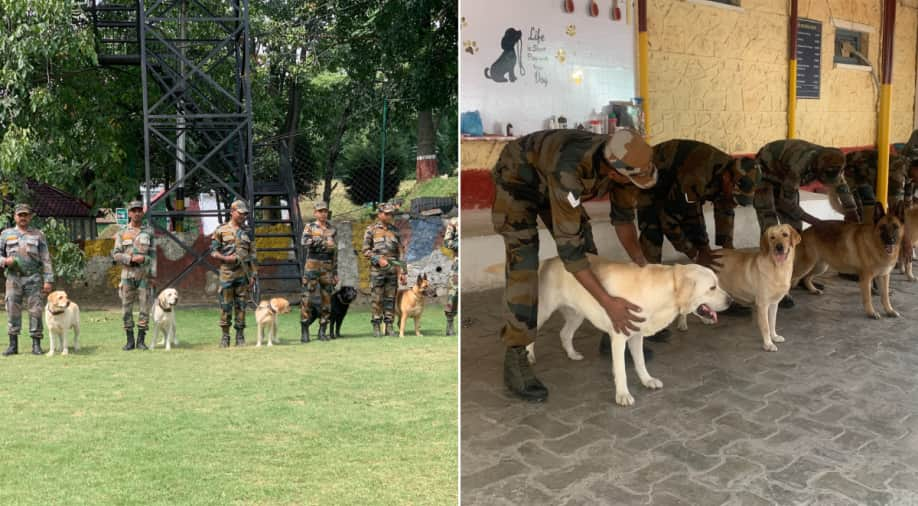- August 29, 2022
- No Comment
- 8 minutes read
Indian Army`s dog squad, a reason for safe and successful anti-terror operations in Jammu & Kashmir – WION



Indian Army Dog unit Photograph:( WION Web Team )
The dogs from the Unit are first sent to detect the location of the hiding terrorists and detect the arms and ammunition the terrorists are carrying. The cameras fitted on these dogs are monitored through a control room. These dogs are trained to enter the location of the hiding terrorists without getting noticed by terrorists.
Do you know the canine team of the Indian Army is the first responder in every anti-terror operation in Jammu and Kashmir? The success of these operations mostly depends on the highly trained members of the Indian Army’s dog squad.
The security forces in Jammu and Kashmir are using high-tech equipment like drones and pan-tilt-zoom (PTZ) cameras in anti-terror operations. And now the dogs equipped with GoPro cameras and walkie-talkies used for giving commands to them during operations. This has proven to be one of the most effective and safest ways to carry out an operation.
googletag.cmd.push(function() {
googletag.defineSlot(‘/11440465/Wionews_Web/Wionews_AS_Inarticle_1_300x250’, [300, 250] , ‘div-gpt-ad-AS-Inarticle-1’).addService(googletag.pubads());;
googletag.display(‘div-gpt-ad-AS-Inarticle-1’);
});
The dogs from the unit are first sent to detect the location of the hiding terrorists and the arms and ammunition they are carrying. The feed from cameras fitted on these dogs is monitored from a control room. These dogs are trained to enter the location of the hiding terrorists without getting noticed by them. They are also trained not to bark during these operations.
If these dogs are noticed by the hiding terrorists and are attacked by them, the dogs respond with a counter-attack. The handler of the dog always keeps a sharp vigil on the situation.
googletag.cmd.push(function() {
googletag.defineSlot(‘/11440465/Wionews_Web/Wionews_AS_Inarticle_2_300x250’, [300, 250] , ‘div-gpt-ad-AS-Inarticle-2’).addService(googletag.pubads());
googletag.display(‘div-gpt-ad-AS-Inarticle-2’);
});
Read more: Indian Army dog Axel, killed during anti-terror op, to be conferred highest gallantry award
”Our dogs are doing wonderful service for the Army as well as the civil population in city areas. They are being used extensively for explosive detection in Road Opening Party (ROP) duties, for sanitising any VIP or vulnerable area. They are actively used as the first responders in the operations also,” said Abhay Khokhar, Lt Col, Dog Squad, Indian Army.
The Indian Army has various breeds of dogs in its units across India. These include labradors, german shepherds, Belgian malinois and great mountain swiss dogs. Among the Indian breeds, the mudhol hound is part of the units as well. These dogs are used for various purposes like guard duty, patrolling, sniffing explosives including Improvised Explosive Devices (IEDs), mine detection, sniffing contraband items, including drugs, and attacking targets.
”We have eight major specialities of army dogs in the Indian Army, they are used for explosive and mine detection, tracking, search and rescue operations, avalanche rescue missions and other situations as per requirements. We train dogs as per the requirements of the Indian Army. Majorly, we have labradors, german shepherds, and recently introduced Belgian shepherds. Apart from these international breeds, we have tried certain Indian breeds also like Mudhol Hounds. We have trained them for various tasks, and they have been deployed in the Indian Army and are doing well,” added Lt Col Abhay Khokhar.
Every Indian Army dog has a handler to train and guide them daily. The main training starts at the Remount and Veterinary Corps Centre and College in Meerut. These dogs are trained for over nine months and later for three months on the ground. The Army keeps these dogs for around seven-eight years depending on their agility. These dogs are provided special food and nutrition to keep them healthy and active.
“All these dogs are trained at the RVC Centre and College at Meerut where we have a proper facility for training. After training, these dogs are inducted into dog units which are mostly in the field. We keep training them as per requirements in the operational areas. They are given a balanced diet comprising rice, milk, meat vegetables, dog biscuits and other supplements,” said Lt Col Khokhar.
The Indian Army has more than 27 dog units across the country. Around 24 dogs are a part of one unit. Some dogs are born in the RVC Centre and some of them are brought from outside. The Indian Army chooses the best ones and trains them after checking if they are suited for the environment.
”There are many things that we look for in an Army Dog. We see whether the dog is trainable and suited for the environment they are to be placed in. Whether they are fit for Indian weather, summer, and winters. We keep all this in mind and then select a breed and give them respective tasks. Every breed has its pros and cons. We select the breeds keeping in mind the task for them. For protection work, for guard duties, and assault duties, we prefer Belgian shepherds and german shepherds. For sniffing purposes, we use labradors. We are using mudhol hounds, cocker spaniel, and many other Indian breeds,” he added.
The Indian Army even has special awards for dogs for their bravery. From the Chief of Army Staff Commendation Card, Vice Chief of Staff Commendation Card and GOC in Chief Commendation Card, these dogs are awarded for their performance during various operations.
The Indian Army recently lost a dog named Axel in an operation in Jammu and Kashmir. Axel was shot dead by terrorists in North Kashmir’s Baramulla district. Two-year-old Axel was given a gallantry award by the Government of India on Independence Day.
WATCH WION LIVE HERE:
Stay connected with us
© 2022. India Dot Com Private Limited. All Rights Reserved.

